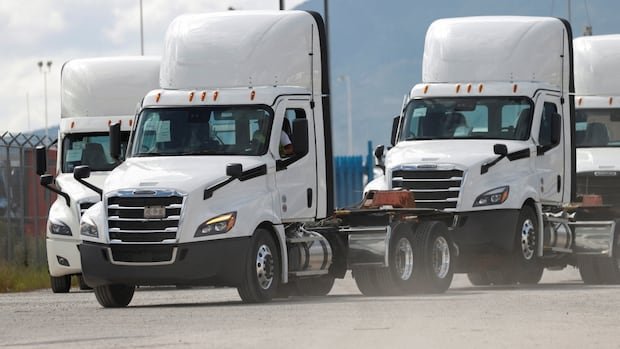All medium and heavy-duty trucks entering the United States will be subjected to a 25% tariff rate effective from November 1, as announced by U.S. President Donald Trump. This move represents a significant escalation in efforts to shield U.S. companies from overseas competition.
President Trump had previously stated that heavy truck imports would be subjected to new duties by October 1 for national security reasons. The rationale behind these new tariffs is to safeguard domestic manufacturers from what is perceived as unfair competition from abroad, benefiting companies like Paccar-owned Peterbilt and Kenworth, as well as Daimler Truck-owned Freightliner.
While trade agreements with Japan and the European Union have led to 15% tariffs on light-duty vehicles, it remains uncertain if similar rates will apply to larger vehicles.
Additionally, the Trump administration has permitted manufacturers to offset the value of U.S. components from tariffs paid on light-duty vehicles manufactured in Canada and Mexico.
The category of larger vehicles includes various types such as delivery trucks, garbage trucks, public utility trucks, transit and school buses, tractor-trailer trucks, semi-trucks, and heavy-duty vocational vehicles.
The U.S. Chamber of Commerce had previously advised the Commerce Department against imposing new truck tariffs, noting that major import sources including Mexico, Canada, Japan, Germany, and Finland are allies or close partners of the United States and do not pose a national security threat.
Mexico stands out as the primary exporter of medium and heavy-duty trucks to the U.S. A study revealed that imports of these larger vehicles from Mexico have tripled since 2019, reaching approximately 340,000 units today based on government data.
Under the Canada-U.S.-Mexico free trade agreement (CUSMA), medium and heavy-duty trucks are exempt from tariffs if at least 64% of a heavy truck’s value originates in North America, including components like engines, axles, raw materials such as steel, or assembly labor.
Possible implications of the tariffs extend to Stellantis, the parent company of Chrysler, which manufactures heavy-duty Ram trucks and commercial vans in Mexico. Stellantis has been lobbying against steep tariffs on its Mexican-made trucks.
Furthermore, Sweden’s Volvo Group is constructing a $700 million heavy-truck factory in Monterrey, Mexico, scheduled to commence operations in 2026.
Mexico hosts 14 manufacturers and assemblers of buses, trucks, and tractor trucks, along with two engine manufacturers, according to the U.S. International Trade Administration.
Mexico has expressed opposition to the new tariffs, asserting that Mexican trucks exported to the U.S. contain an average of 50% U.S. content, including diesel engines.
In the prior year, the U.S. imported nearly $128 billion worth of heavy vehicle parts from Mexico, constituting about 28% of total U.S. imports, as per Mexico’s statement.

